Opium worth US$ 3.89
billion calculated with New York street value destroyed
Poppy seeds,
seized narcotic drugs, precursor chemicals, paraphernalia torched in Laukkai,
Kokang region
[ 8 June,2002 ]
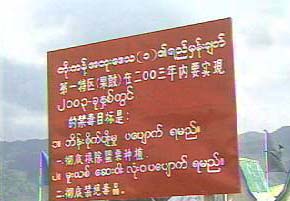
The
Destruction Ceremony of poppy seeds presented by farmers, seized narcotic drugs,
precursor chemicals and paraphernalia, organized by the Central Committee for
Drug Abuse Control, was held at the Drug Elimination Museum in Laukkai, Kokang
region, Special Region-1, Shan State (North), yesterday morning, with an address
by Chairman of the Central Committee for Drug Abuse Control Minister for Home
Affairs Col Tin Hlaing.
Also present on
the occasion were Deputy Minister for Agriculture and Irrigation Brig-Gen Khin
Maung, Deputy Minister for Livestock and Fisheries U Aung Thein, Col Than Win of
Laukkai Station, the representative of UNDCP, departmental heads, the Japanese
Ambassador, Charges d’ Affaires ai of the US embassy and the Chinese embassy,
CCDAC Joint Secretary Police Col Kham Aung and members, members of work groups,
national race leader U Phon Kyar Shin of Shan State (North) Special Region-1 and
officials, Deputy Head of the Drugs Control Department Mr Chaung Shi Myin and
party of Yunnan Province of the People’s Republic of China, officers of Myanmar
Police Force, Director (News) U Hla Tun of News and Periodicals Enterprise and
information officials, Secretary of Myanmar Foreign Correspondents Club U Nyunt
Tin and members, correspondents of foreign news agencies, officials of Border
Area Development Association, the flag-bearing troupe, the pom-pom dance troupe,
the band troupe, the traditional Ozi troupe and guests.
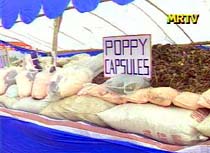
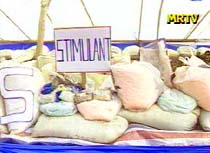
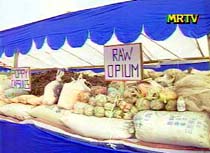
Poppy Capsules,
Stimulant Raw Opium and Opium Seeds.
Daw Nang Khin
Phone Myint and Ma Pyone Myint Han of Laukkai Basic Education High School No 2
acted as masters of ceremonies.
CCDAC Chairman
Minister for Home Affairs Col Tin Hlaing delivered an address. He said:
It is an
undeniable fact in history that two kinds of legacy inherited in the era of
colonialism of the past such as armed insurrection of the national races and the
production of opium has made the ill-famed activities prolonged and opened
opportunities to external interventions so much so that it has developed from
the production of ordinary opium into highly concentrated heroin products.
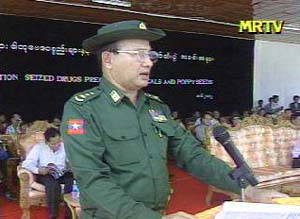
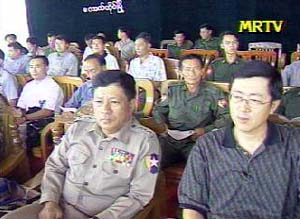
CCDAC Chairman
Minister for Home Affairs Col Tin Hlaing delivered an address.
After the
Tatmadaw Government took over the State power in 1988, the policy of national
unity was laid down stressing priority in national solidarity, development of
the border regions and the national races. After realizing the Government’s
objectives with sincere intentions, 17 armed insurgent groups have come back
into the legal fold. This unprecedented success laid open for the first time in
the post-independence period, opportunities and access to all round development
programmes in the entire country and fulfillment of the basic needs of the
inhabitants of the border region.
Since peace and
stability were established, access to far-flung and remote places made possible
to carry out prevention and suppression of opium production. As a result of the
changing situation, the approach and tactics of addressing drug eradication have
also changed by focusing not only on law enforcement activities but coupling
with alternative development programmes.
The drug problems
of Myanmar are not only dependent on and inter-related with stability, peace,
development and solidarity among the national races but also mixed with the
regional development, education, health, social, and development of the quality
of life of the inhabitants of the regions. As the eradication of drugs has been
carried out focusing on the development of fundamental needs and infrastructure
development, the local inhabitants and ethnic groups realizing the sincere
intentions of the Government have fully cooperated with the programmes.
Mongla Special
Region 4 in the Eastern Shan State, established as an opium free zone in April,
1997 stands testimony to this successful cooperation.
Acknowledging the
Government’s sincere efforts, the leaders of the ethnic groups have joined hands
with the government in constructing roads, bridges, canals, dams, hydro-power
stations and communications stations as the fundamental items to develop the
border region and the national races as well as development in crop
substitution, livestock breeding for income substitution, education, health
sectors with a view to strengthening solidarity and unity among the ethnic
brethren.
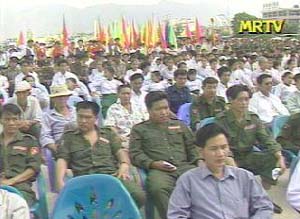
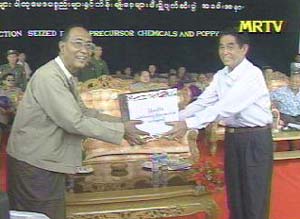
Myanmar Border Area
Development Association Chairman U Tin Hlaing presented
487
dozens of exercise books and 100 dozens of pencil worth K 499,650 and
medicine
worth K 562,350 to Kokang region to national race leader U Phon Kyar Shin.
The signs of
success effected the Kokang and Wa regions. Consequently, the leaders of Kokang
and Wa with the full support of their peoples have launched crop substitution
and income substitution programmes in their respective regions to finally get
rid of opium production by 2005. This confidence in the national races is one of
the reasons that prompted Senior General Than Shwe to give guidance to draft a
15-year elimination plan starting 1999-2002 to 2013-2014 fully relying on our
own resources. The 5 projected activities of the 15-year plan are supply and
demand elimination of narcotic drugs, organizing the participation of the local
populace, law enforcement and international cooperation.
At present, the
Central Committee for Drug Abuse Control has launched “Project New Destiny” in
the regions where poppy cultivation is highly concentrated like the Northern
Shan State, the Southern Shan State and the Eastern Shan State. The Project
calls for prevention of poppy cultivation by taking action with administrative
means, distribution of substitute crop-seeds for poppy, the control of opium
seeds and taking legal actions. The opium farmers are asked to grow 7 kinds of
alternative crops instead of opium in 21,969 acres of land as a preventive
measure. Substitute seeds are also distributed in time for cultivation to
prevent them from falling back to poppy cultivation.
While educating
the farmers to grow substitute crops instead of poppy, substitute crop seeds
that are suitable for the areas and climate are distributed for cultivation on
the other hand, On realizing the sincere intentions of the Government, the opium
farmers, on their own accord, have come up voluntarily to submit opium seeds
they have kept for the next season. To this date, 95,659.507 kilos of poppy
seeds and 76,230.073 kilos of dried poppy bulb in the Northern Shan State, 2,242.109 kilos
of poppy seeds in the Southern Shan State, 92.60 kilos of poppy seeds and 0.40825
kilos of dried poppy bulb in the Eastern Shan State, 8.165 kilos of
poppy seeds in the Kayah State and 3,287.229 kilos of poppy seeds in Mandalay
Division, making a total of 101,289.07 kilos of poppy seeds and 76,230.481 kilos
of dried poppy bulb totaling 120,346.6898 kilos of opium seeds and opium bulbs have been
voluntarily surrendered to the authorities. In a way, such quantity of seeds
that would be grown in over 73,679 acres has been prevented.
Estimated with
the yield rate of 4.4 kilo per acre, the output would be 324.2 tons of opium or
32.42 tons of heroin worth 3.89 billion US$ calculated with the New York street
value of 120,000 US$ per kilo of heroin.
In Laukkai
region, they have formed up drug suppression teams on their own and from 1st to
the 15th of April 2002, a total of 52 paraphernalia were discovered and seized
from the valleys and mountains. It is indication that the local residents had
been fully cooperating with the Government.
With regard to
drugs control, Myanmar has been cooperating with neighbouring countries as well
as countries in the sub-region and region.
Moreover, within
2001 and 2002, Myanmar handed over drug traffickers wanted in China for 8 times
including 13 drug traffickers by the Wa on their own arrangement. Documents were
also handed over once. Such events have clearly proved that Myanmar is very
serious and deeply committed to combating drugs. Myanmar attaches great
importance to cooperation in the region and in the international arena and the
international media has picked up such incidents.
The above
presentation in the efforts and success of drug control covers only some of the
activities on Myanmar in cooperation with other countries.
In conclusion, I
would like to express here that this Destruction Ceremony to destroy the poppy
seeds, seized drugs, chemicals and paraphernalia clearly indicates the result of
the commitment and full cooperation of the local inhabitants. If the local
inhabitants are fully committed and show this sort of cooperation. I am fully
confident the drug scourge threatening the whole mankind will not find a place
on the soil of Myanmar.
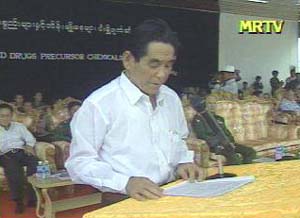
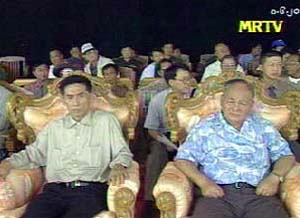
Kokang region national race leader U Phon Kyar
Shin explains endeavours for
establishment of opium free zone in Kokang region by the year 2003.
Then, Kokang
national race leader U Phon Kyar Shin explained endeavours of their region to
eradicate opium cultivation. He said:
First, on behalf
of the Administrative Committee of Special Region No 1 and regional people of
Kokang region. May I extend warm welcome to all of you, the State leaders and
personnel from international organizations.
By studying the
history of narcotic drugs in Kokang region, we can find that narcotic drugs have
been in existence for over 100 years till up to now. The tasks of narcotic
elimination can abolish the menace of narcotic drugs to human society. This duty
has now dwelt upon our shoulders. When we look back at the past ten years, we
were looked down on because of the reflection of narcotic drugs. This’s why we
live in humble with patience. We had to pay a great amount because of this
narcotic drugs.
At these recent
years, under the guidance and goodwill of the State government, members of our
associations took active role in carrying out the tasks of drugs eradication. So
the task of drugs eradication has now become wider and changed its appearance as
in its outer and inner parts. We can predict that like this occasion of
destroying narcotic drugs can never be occurred in the coming years. Poppy
cultivation in Kokang region can also be ceased. We have laid down plan for
eradication of poppy cultivation in this special region. We have assured that
there will be no more poppy cultivation in this region by the year 2003. This
promise can be implemented in this Kokang special region.
By looking back
at past experience of carrying out the drug eradication tasks we had encountered
difficulties, had to repay a great amount and had been tested with various
experiments. This drugs problem is the legacy of the history and make people to
keep out danger of narcotic drugs has become our unavoidable duty. After taking
peace with the State government, Administrative Committee of Special Region-1
has been formed since 1989 in this Kokang region and has been implementing the
drug elimination tasks with added momentum. This activity has never stopped
during the past 10 years. However this problem has been deeply rooted in this
region that the progress of carrying out the drug eradication tasks never
reached as we hoped to do so. It is not possible to solve the difficult problem
at once. Drug problem in Kokang cannot be solved in a short time according to
the natural law.
In the past drug
elimination tasks have been carried out continuously. However, our efforts could
not get true realizations. The only things we obtained are that being looked
down upon us, being blamed and rumours about us. That is why we felt very sorry
about that.
Hence, all people
must be active and participating the activities of drug eradication and facing
all difficulties, opium cultivation is to be eradicated completely with added
momentum. On 2 March, 2002, a decision was made for total eradication of opium
cultivation in 2002. It is much earlier than the previously target of 2005 for
total eradication. After this decision was made, as the task is being carried
out continuously, the materials shown at today’s ceremony are those which are
seized in the present activities. It is the evidence of out activities of drug
eradication. Establishing the special region-1 as the opium free zone beginning
2003 is the only goal of the people in special region-1 and group members.
It is a problem
connected with the food, clothing and shelter in the special region. To solve
this problem providing assistance from every factors is needed. I would like to
request the organizations and observers for drug abuse control with the goodwill
to have right understanding on us and to give practical assistance more.
It is to realize
that narcotic drug eradication is the problem of all the people in the world,
not only of a region and a country. Hence, I think it will be easier to solve
the burden of food, clothing and shelter of the people in Kokang after the
activities of narcotic drug abuse control and the total eradication of opium.
As conclusion,
including opium cultivation, total eradication of narcotic drugs is our main
goal. I would like to state that from 2003, setting up and performing Kokang as
a narcotic drugs free zone is our great effort and great goal.
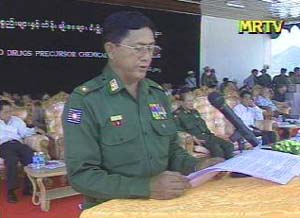
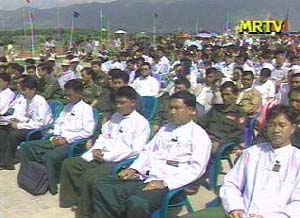
Deputy
Minister for Agriculture and Irrigation Brig-Gen Khin Maung explained
matters
related to endeavours on development of border areas and opium substitute
cultivation.
Next, Deputy
Minister for Agriculture and Irrigation Brig-Gen Khin Maung explained matters
related to endeavours on development of border areas and opium substitute
cultivation. He said: The first step being as you all know, is the regional
development task in agriculture, livestock breeding, health, education,
construction of roads and bridges, power supply, etc. carried out by the
Ministry of Progress of Border Areas and National Races and Development Affairs.
If we look back at the situation of Kokang region, until 1989, main roads were
just ordinary ones and unlike now, regions like “Chin Shwe Haw”, “Par Sin Kyaw”
and “Lauk Kai”, were without buildings, electricity, school, hospitals and
dispensaries.
In the
agricultural sector you will also notice the presence of rubber, sugarcane,
vegetable and maize plantations, high-yielding paddy, hybrids, in addition to
dams like Shiphan; “Larlee”, “Sitone Shwe” and “Man Khar” and the development of
irrigation systems.
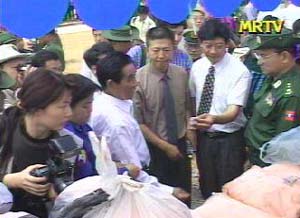
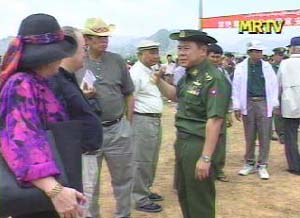
CCDAC
Chairman Minister for Home Affairs Col Tin Hlaing, Kokang region national race
leader
U Phon Kyar Shin and Deputy Head of Narcotic Drugs Elimination Department Mr
Chong Sheng Meng of
Yunnan Province and party inspect opium bulbs and narcotic drugs.
In fact for the
speedy development of agriculture and livestock breeding in Kokang and Kachin
regions, a group of four deputy ministers, have been especially assigned by the
Secretary-1 of the State Peace and Development Council in October 2001 during
his tour of Kokang.
In Kokang area,
941 acres of land prepared for poppy cultivation could be substituted with
wheat, beans and pulses in last October and November, 462 acres were grown with
mangoes, orange, lychee, longons, grapes plantation etc. For that, for which the
Government has spent 48.9 million kyats. Plans are also under way to distribute
20,000 trees of other kinds of fruits like walnuts, during this year in “Tar
Shwe Htan” village.
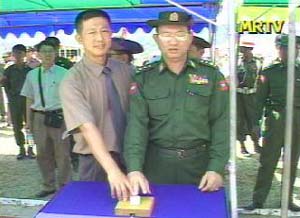
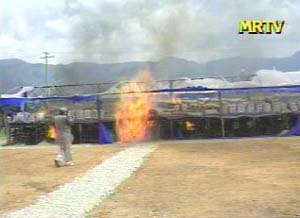
CCDAC
Chairman Minister for Home Affairs Col Tin Hlaing and Deputy Head of Drugs
Control Department
Mr Chong Sheng Meng of Yunnan Province torch seized drugs, chemicals and
paraphernalia.
The leader of
Kokang special region-1, has also set up a livestock breeding farm on 150 acres
as opium substitute undertaken near “Yan Lon Kyaing” village and has arranged to
build a dam at a cost of 8.5 million kyats close to it. Likewise in Kachin
State, 325 acres of farmland and 300 acres of orchard could be developed, and “Nant
San Yan” weir to irrigate 5,000 acres that had been built at a cost of 77.2
million kyats by government.
The second step
being 52.5 million kyats assisted by CCDAC, for the cultivation of opium
substitute crops, in time for the years 2002-2003 monsoon cultivation season on
13,528 acres.
In other words,
edible crops will be produced from the land prepared for poppy crops. For
Laukkai region, paddy, maize, wheat, buckwheat, beans and pulses seeds for 3,064
acres have been distributed and assisted by Kokang national race leader U Phon
Kyar Shin and Kokang Organization.
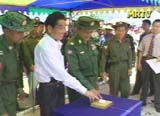
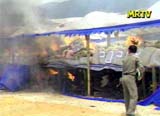
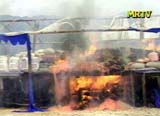
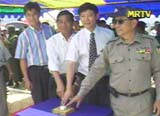
The pressed the buttons
of the remote controls to set fire to drugs, precursor chemicals, paraphernalia
and opium seeds.
As such
assistance rendered by the agricultural sector for the development of border
areas and cultivation of opium substitute crops is meeting with success. Based
on this, we would carry on with our assistance, for the regional and
socio-economic developments of our national brethren and eradication of
cultivation and production of opium crops.
Afterwards,
Myanmar Border Area Development Association Chairman U Tin Hlaing presented 487
dozens of exercise books and 100 dozens of pencil worth K 499,650 and medicine
worth K 562,350 to Kokang region to national race leader U Phon Kyar Shin.
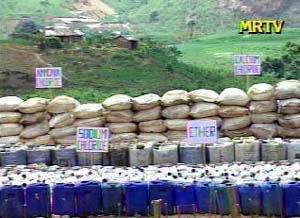
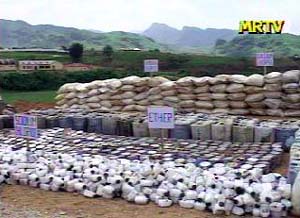
Precursor chemicals and
liquid at the narcotic drugs destruction ceremony in Laukkai.
Then, Minister
for Home Affairs Col Tin Hlaing and members and the guests inspected opium seeds
presented by farmers and narcotic drugs and paraphernalia seized in Laukkai
region.
Next, Minister
for Home Affairs Col Tin Hlaing, Deputy Minister for Agriculture and Irrigation
Brig-Gen Khin Maung, Shan State (North) Special Region-1 national race leader U
Phon Kyar Shin and officials, Deputy Head Mr Chong Sheng Meng of Drugs
Elimination Department of Yunnan Province and party took designated places and
pressed the buttons of the remote controls to set fire to drugs, precursor
chemicals, paraphernalia and opium seeds. Afterwards, CCDAC Chairman Minister
for Home Affairs Col Tin Hlaing and party and the guests visited the Drug
Elimination Museum in Laukkai, Kokang Region. Next, national races, members of
Red Cross and USDA and students destroyed precursor chemicals.
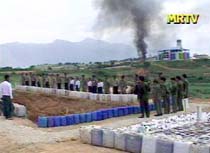
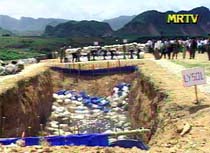
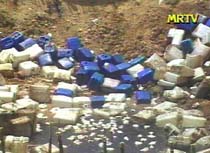
Members of MPF, Red
Cross, USDA, Kokang national races and students destroy
precursor chemicals and liquid at the narcotic drugs destruction ceremony in
Laukkai.
Today’s seized
narcotic drugs destruction ceremony on 8 June, organized by CCDAC in Laukkai, 12,776.6 kilos of opium seeds, stimulant tablets weighing 2.72
kilos, amphetamine tablets solid weighing 119.41 kilos, amphetamine powder
weighing 23.1 kilos, 1.209 kilos of caffeine, 0.055 kilo of heroin, 50 kilos of
opium sediment, tablets containing Ephedrine weighing 10.8 kilos, 0.5 kilo of
Ice, 136.38 litres of opium liquid, 34.1 litres of opium liquid plus Lysol,
568.25 litres of acid anhydride, 11.36 kilos of hydrochloric acid, 1,591.1
litres of Lysol, 1,545.68 litres of alcohol, 529 litres of hydrochloric acid,
68.19 litres of ether, 320 litres of tinder, 1,704.75 litres of water plus
Lysol, 9,184.5 kilos of chemical powder and 23 paraphernalia were destroyed.
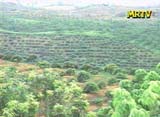
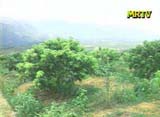
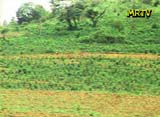
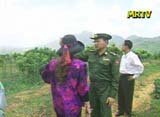
Opium substitute mango,
lychee and longan trees thriving in Namtip Township, Wa Special Region.
After the
ceremony, Minister for Home Affairs Col Tin Hlaing, the deputy ministers, the
diplomats and journalists viewed thriving of 450,000 lychee and longan trees,
10,000 mango trees and 550,000 rubber trees in Namtip Township of Shan State
(North) Wa Special Region-1.